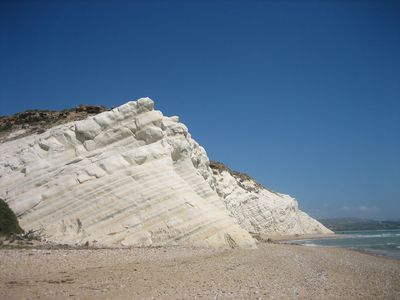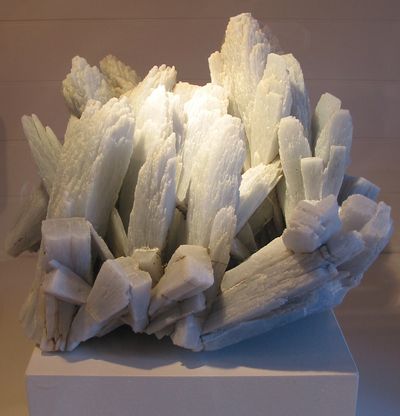Difference between revisions of "Evaporite"
Jump to navigation
Jump to search



FWhitehurst (talk | contribs) m (added Category:Sedimentology and stratigraphy – carbonate using HotCat) |
m (Added images) |
||
| Line 1: | Line 1: | ||
| + | [[file:Halite-249324.jpg|thumb|300px|A stunning halite specimen of water-clear, stacked echelon and offset cubes. From the famed salt deposits at Stassfurt, Saxony-Anhalt, Germany. Courtesy Rob Lavinsky, [http://iRocks.com iRocks.com], CC-BY-SA 3.0.]] | ||
| + | |||
| + | [[file:Gypsum_formation_of_Capo_Bianco.jpg|thumb|400px|Gypsum formation of Capo Bianco, at the mouth of the river Platani, Sicily. Courtesy [https://commons.wikimedia.org/wiki/File:Gypsum_formation_of_Capo_Bianco.jpg Wikimedia Commons], Creative Commons Attribution-Share Alike 3.0 Unported license.]] | ||
| + | |||
| + | [[file:Anhydrite_HMNH1.jpg|thumb|400px|Anhydrite from Chihuahua, Mexico. Courtesy [https://en.wikipedia.org/wiki/Anhydrite Wikipedia].]] | ||
| + | |||
Evaporites are minerals produced by the evaporation of water. This may occur in marine or nonmarine settings. The common evaporite minerals associated with petroleum exploration are halite, gypsum, and anhydrite. | Evaporites are minerals produced by the evaporation of water. This may occur in marine or nonmarine settings. The common evaporite minerals associated with petroleum exploration are halite, gypsum, and anhydrite. | ||
Revision as of 20:36, 30 June 2014

A stunning halite specimen of water-clear, stacked echelon and offset cubes. From the famed salt deposits at Stassfurt, Saxony-Anhalt, Germany. Courtesy Rob Lavinsky, iRocks.com, CC-BY-SA 3.0.

Gypsum formation of Capo Bianco, at the mouth of the river Platani, Sicily. Courtesy Wikimedia Commons, Creative Commons Attribution-Share Alike 3.0 Unported license.

Anhydrite from Chihuahua, Mexico. Courtesy Wikipedia.
Evaporites are minerals produced by the evaporation of water. This may occur in marine or nonmarine settings. The common evaporite minerals associated with petroleum exploration are halite, gypsum, and anhydrite.
This article is a stub. You can help AAPG Wiki by expanding it.